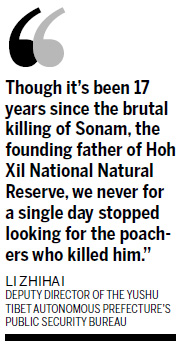Arrests made in legendary case
Updated: 2011-12-06 07:40
By Cui Jia (China Daily)
|
|||||||||||
BEIJING - Police nationwide will continue to the search for the last three poachers involved in the killing of Sonam Dargye, a hero in saving Tibetan antelopes from extinction in Hoh Xil, Qinghai province, after the recent surrender of six suspects after 17 years in hiding, authorities said.
"Though it's been 17 years since the brutal killing of Sonam, the founding father of Hoh Xil National Natural Reserve, we never for a single day stopped looking for the poachers who killed him," said Li Zhihai, deputy director of the Yushu Tibet autonomous prefecture's public security bureau, in an exclusive interview with China Daily on Monday.
|
 |
Since the 1980s, large groups of poachers went to Hoh Xil for Tibetan antelopes and thousands of the creatures were slaughtered for their precious underwool. Illegal poaching reduced the Tibetan antelope population from a former peak of nearly 1 million to just 10,000.The Tibetan antelope, endemic to the Qinghai-Tibet Plateau of West China, is considered endangered by the International Union for Conservation of Nature and tops China's protected species list.
In July 1992, under the insistence of Sonam, then-deputy secretary of the prefecture's Zhiduo county, a working committee was established, which was mainly in charge of the protection of Hoh Xil and fighting poaching.
On Sonam's 13th and last patrol around Hoh Xil on Jan 18, 1994, his small team caught 20 poachers with more than 1,800 Tibetan antelope skins.
The poachers attacked him as he was bringing them to the police station. His team members went for help, and Sonam stayed behind to fight.
When his body was found, he was in a shooting position, guns held firmly. One poacher was killed at the scene and another was later sentenced to death for murder, according to Li.
For police in Yushu, solving Sonam's case, which shocked the nation, remained a top priority.
"The Ministry of Public Security wanted to speed up the capture of the fugitives ... this year and said anyone who turned themselves in before Dec 3 would be dealt with leniently. Our police officers have regularly visited the homes of the suspects since May and encouraged their relatives to have them come out of hiding," Li said.
Six of the nine remaining suspects turned themselves in between Nov 20 and Dec 1, leaving the three main suspects still at large.
"I heard the news on Dec 2, but I won't tell my mother or other relatives until the case is closed and all of the poachers who killed my uncle have been caught," said Phurdo Tsering, 30, Sonam's nephew, a member of the forest police in Hoh Xil National Natural Reserve, and like his uncle and father, a guardian of the Tibetan antelope.
"My father's last words were to ask me to protect Hoh Xil. It runs in the family."
Phurdo said working conditions improved a lot and he is glad that no large-scale poaching has been found since 2008.
At the entrance of the Hoh Xil National Natural Reserve stands a white monument with Sonam's name inscribed on it. Residents and visitors keep the monument decorated and clean.
"I believe the best way for people to remember my uncle is to leave Hoh Xil as pure as it should be," Phurdo said.
Related Stories
Wild animals thrive in Hoh Xil Nature Reserve 2011-10-24 11:33
"Hoh Xil, home of the Chiru" 2009-12-18 07:52
Train passes Hoh Xil, home to Tibetan antelopes 2006-07-01 16:30
Hot Topics
HIV/AIDS, Egypt protest, Thanksgiving, climate change, global economic recovery, home prices, high-speed railways, school bus safety, Libya situation, Weekly photos
Editor's Picks

|

|

|

|

|

|







